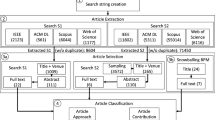Abstract
Software processes are dynamic entities that are often changed and evolved by skillful knowledge workers such as software development team members. Consequently, flexibility is one of the most important features within software process representations and related tools. However, in the everyday practice, team members do not wish for total flexibility. They rather prefer to learn about and follow previously defined advices on which, where and how they can change/adapt process representations. In this paper we present FlexSPMF: a framework for modelling controlled flexibility in software processes. It comprises three main contributions: 1) identifying a core set of flexibility concepts; 2) extending a Process Modelling Language (PML)’s metamodel with these concepts; and 3) providing modelling resources to this extended PML. This enables process engineers to define and publish software process models with additional (textual/graphical) flexibility information. Other team members can then visualise and learn about this information, and change processes accordingly.
Preview
Unable to display preview. Download preview PDF.
Similar content being viewed by others
References
Cugola, G.: Tolerating Deviations in Process Support Systems via Flexible Enactment of Process Models. IEEE Transactions on Software Engineering 24(11), 982–1001 (1998)
Reichert, M., Rinderle-Ma, S., Dadam, P.: Flexibility in process-aware information systems. LNCS Transactions on Petri Nets and Other Models of Concurrency (ToPNoC) 2, 115–135 (2009)
Bider, I.: Masking Flexibility Behind Rigidity: Notes on How Much Flexibility People are Willing to Cope With. In: Pastor, Ó., Falcão e Cunha, J. (eds.) CAiSE 2005. LNCS, vol. 3520, pp. 7–8. Springer, Heidelberg (2005)
Borch, S.E., Stefansen, C.: On Controlled Flexibility. In: Proc. of the 7th Workshop on Business Process Modeling, Development and Support (BPMDS), pp. 121–126 (2006)
Cass, A.G., Osterweil, L.J.: Process Support to Help Novices Design Software Faster and Better. In: Proc. of the 20th IEEE/ACM Intl. Conference on Automated Software Engineering (ASE), pp. 295–299 (2005)
OMG: Software Process Engineering Metamodel Specification, v2.0. Technical report, Object Management Group (2007)
Novak, J.D., Cañas, A.J.: The theory underlying concept maps and how to construct and use them. Technical report, IHMC CmapTools, 2006-01 Rev 2008-01, Florida Institute for Human and Machine Cognition (2008)
Razmerita, L., Lytras, M.D.: Ontology-based user modelling personalization: Analyzing the requirements of a semantic learning portal. In: Lytras, M.D., Carroll, J.M., Damiani, E., Tennyson, R.D. (eds.) WSKS 2008. LNCS (LNAI), vol. 5288, pp. 354–363. Springer, Heidelberg (2008)
Martinho, R., Domingos, D., Varajão, J.: On a concept map for the modelling of controlled flexibility in software processes. Technical report TR-2009-12. Dep. de Informática, Faculdade de Ciências da Universidade de Lisboa (May 2009)
Jacobson, I., Booch, G., Rumbaugh, J.: The Unified Software Development Process. Addison-Wesley Longman Publishing Co., Inc, Boston (1999)
Regev, G., Soffer, P., Schmidt, R.: Taxonomy of Flexibility in Business Processes. In: Input to the 7th Workshop on Business Process Modeling, Development and Support (BPMDS 2006) (June 2006), http://lamswww.epfl.ch/conference/bpmds06/taxbpflex
Schonenberg, H., Mans, R., Russell, N., Mulyar, N., van der Aalst, W.M.P.: Towards a taxonomy of process flexibility. In: CAiSE 2008, pp. 81–84 (2008)
Gamma, E., Helm, R., Johnson, R., Vlissides, J.: Design Patterns: Elements of Reusable Object-Oriented Software. Addison-Wesley, Reading (1995)
Martinho, R., Domingos, D., Varajão, J.: FlexUML: A UML Profile for Flexible Process Modelling. In: Proc. of the 19th Intl. Conference of Software Engineering and Knowledge Engineering (SEKE), pp. 215–220 (2007)
OMG: Unified Modeling Language: Superstructure, version 2.0. Technical report, Object Management Group (2005)
Martinho, R., Varajão, J., Domingos, D.: A two-step approach for modelling flexibility in software processes. In: Proc. of the 23rd IEEE/ACM Intl. Conference on Automated Software Engineering, ASE (2008)
Wörzberger, R., Kurpick, T., Heer, T.: On correctness, compliance, and consistency of process models. In: Proc. of the 17th IEEE Intl. Workshops on Enabling Technologies: Infrastructures for Collaborative Enterprises, WETICE 2008 (2008)
Author information
Authors and Affiliations
Editor information
Editors and Affiliations
Rights and permissions
Copyright information
© 2009 Springer-Verlag Berlin Heidelberg
About this paper
Cite this paper
Martinho, R., Varajão, J., Domingos, D. (2009). FlexSPMF: A Framework for Modelling and Learning Flexibility in Software Processes. In: Lytras, M.D., et al. Visioning and Engineering the Knowledge Society. A Web Science Perspective. WSKS 2009. Lecture Notes in Computer Science(), vol 5736. Springer, Berlin, Heidelberg. https://doi.org/10.1007/978-3-642-04754-1_9
Download citation
DOI: https://doi.org/10.1007/978-3-642-04754-1_9
Publisher Name: Springer, Berlin, Heidelberg
Print ISBN: 978-3-642-04753-4
Online ISBN: 978-3-642-04754-1
eBook Packages: Computer ScienceComputer Science (R0)




